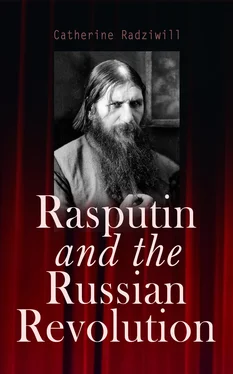The Countess was already an old woman, widow of a man who had been murdered during the revolution of 1905, and, incapable of being even suspected of any frailties of conduct. She was the mother of a large family, and though by no means brilliant, was yet clever in her way, with a slight propensity to intrigue. She was extremely devout, with a strong tendency to exaltation where religious matters came into question, and was continually lamenting what she called the relaxation of modern society in those practices of strict church discipline which Russians belonging to the higher classes have lately taken to forgetting. She would not have missed attending any of the long Church services, sometimes so tiring in the Orthodox faith, which are celebrated on Sundays and many feast days, and she strictly fasted at prescribed times. Indeed, her whole existence was, as regards its daily routine, more that of a nun than of a woman of the world. But for all that, she liked to keep herself well informed as to all that was going on around her, and politics was her especial hobby.
Among those who frequented her house were Mr. Sabler, then Procurator of the Holy Synod, together with his future successor, Mr. Loukianoff; a good sprinkling of ministers—she was distantly related to Mr. Stolypine, a fact that had considerably added to her importance during the latter’s lifetime—and a few influential dames belonging to the immediate circle of friends of the imperial family. All this constituted a coterie that had gradually assumed perhaps more importance than it really deserved, but that brought into St. Petersburg society an element with which it would not have been wise to trifle and which it was impossible to overlook, for any one caring to concern himself or herself with the course that public affairs were taking and assuming.
A few years before the time I am referring to, that is about 1908 or 1909, a good deal of interest was excited not only in St. Petersburg, but in the whole of Russia, by a monk called Illiodore, who also preached a new gospel to those willing to listen. There was, however, about him none of the peculiarities which distinguished Rasputin, and no one had ever found one word to say against his morals. But he tried also to found a religion of his own in the sense that he attempted to develop on a higher scale, and with certain Protestant leanings, the feelings of fervour of the people. At Saratoff, where he lived, he did a great deal of good, and he had built there a large church, Orthodox, of course, which soon became a centre of pilgrimage to which flocked thousands and thousands of people desirous of hearing him and of listening to his inflamed speeches. They reminded one of those crusades that in the Middle Ages had stirred whole nations to rise and rush to deliver the Holy Sepulchre from the yoke of the infidels. He was far more a Peter the Hermit than Rasputin, and had, moreover, education, which the other lacked.
But ecclesiastical authorities in St. Petersburg did not approve of his teachings, and he soon came into conflict with them, together with the Bishop of Saratoff, who had all along supported him and who considered him as being really a good and pious man. This conflict led to a quarrel, the result of which was that Illiodore was confined in a monastery, whence, however, with the help of his disciples and adherents, he contrived to make his escape. There was also a whole series of lawsuits, into the details of which it is useless to enter here. At last the monk was unfrocked for rebellion to his superiors, by a decree issued from the Holy Synod, and compelled to take back his secular name of Trufanoff. He became fearful of further annoyance and managed to get hold of a false passport, with the help of which he made his way into Norway, where we shall find him presently mixed up in a most extraordinary adventure with which Rasputin was concerned. But before all this had occurred there was a brief period when Illiodore was quite an important personage in Russia, and the salons of the Countess Ignatieff and of other ultra-devout ladies used to see a lot of him whenever he happened to be in St. Petersburg. These feminine listeners were very fond of him, and did their best to spread his reputation all over the capital.
During Rasputin’s wanderings he had come across Illiodore at Saratoff, and the latter, like so many others before and after him, had succumbed to the hypnotic spell which “Gricha” was casting around him. He had believed him to be a real servant of God, and he had engaged him to come to St. Petersburg and to preach there before some of the people who had already listened to his (Illiodore’s) sermons. He had introduced him to the celebrated Father John of Cronstadt, this saintly priest who was so famous for his virtues and his good deeds. And, strange though this may appear, Father John also had been struck by Rasputin’s eloquence and had believed him to be really inspired by the Lord. In order to explain the state of mind prevalent at the time among the orthodox clergy one must say that the clergy, or at least some of their important members, were trying to bring about a revival of religious fervour in the Orthodox Church, especially among persons belonging to the upper classes, who had, during the last twenty-five years or so, become more than indifferent in regard to spiritual matters, and who had considered religion more a question of “convenience” than anything else. Since the religious censorship had been suppressed and books to any amount treating of every conceivable subject had been allowed to circulate freely in the country, the former attachment to the Mother Church had waxed fainter and fainter, until this Church appeared in the eyes of many as simply a question of good breeding, to which it was necessary to conform when one belonged to good society, but which, beyond this, was treated entirely as a matter devoid of importance.
In view of this fact, those Prelates and Dignitaries who lamented over this state of things were not sorry to find that there were still in the world people capable of arousing in the minds of others an interest in religion and religious matters. This explains partly why the craze which seized some persons in regard to Illiodore at first, and to Rasputin later on, was not viewed with the dissatisfaction one might have expected by the Russian ecclesiastical authorities. They argued that surely it was better for people to pray in the way these two so-called “saints” told them to do than not to pray at all. It was only much later, after Illiodore’s rebellion to the orders of his superiors, and Rasputin’s ever-growing personal influence had begun to alarm them, that there were found some bishops in Russia who made a stand against both, until at last a catastrophe removed these two men from the scene of their previous labours and successes.
Rasputin and Illiodore were in time to become mortal enemies, but at first a great friendship united them, and when Rasputin was sentenced to enter a convent in the manner already related, Illiodore took up his cause most warmly and telegraphed to one of the former’s admirers, an ecclesiastic of high rank in St. Petersburg, in the following terms: “Neither Bishop Feofane nor Archimandrite Serge has behaved fairly in regard to the ‘Blessed Grigory.’” Illiodore’s efforts, however, did not avail and Rasputin was ordered to leave the capital immediately. But instead of being compelled to enter the convent whither they had wished to confine him at first, he was allowed to return to his native village of Pokrovskoie. Before doing so he bethought himself of calling on his former patron, Bishop Feofane, but the latter met him with the exclamation, “Don’t approach me, Satan! Thou art not a blessed thing, but only a vulgar deceiver!” At Pokrovskoie Rasputin surrounded himself with twelve sisters, of whom the oldest was barely twenty-nine years of age. They all lived in his house, which was extremely well arranged and richly furnished. Rasputin’s wife, together with her children, was also there and occupied a suite of five rooms, whilst each of the sisters had a separate room to herself.
Читать дальше












